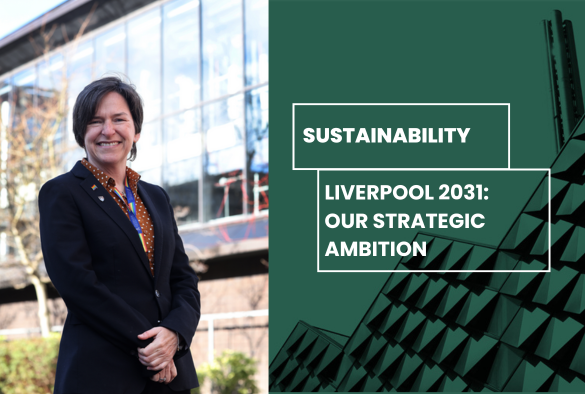Sustainability: "We make our biggest impact through our research and education"

Our New Sustainability Strategy - a blog from Chief Financial Officer and Chair of the Sustainability Committee, Nicola Davies on the sustainability cross-cutting theme of Liverpool 2031.
Sustainability is a priority for the University, and as the Chair of the Sustainability Committee I was delighted when it was embedded as an overarching theme in our strategic framework Liverpool 2031.
We laid the foundations for this back in February 2021 when we launched our first ever Sustainability Strategy. Since then, we have made steady progress toward our initial goals, achieving our target to ensure that all students have the opportunity to learn about sustainability through the introduction of the award-winning Sustainability in Action module, and publishing our Climate Plan in November 2022. We are also close to achieving our target to reduce domestic general waste by 50% by the end of 2025. Compared with our pre-pandemic baseline we have reduced this waste stream from 1,354 tonnes to 770 tonnes, a 43% reduction! You can read more about our work to reduce waste in this blog post.
Ensuring that sustainability is built into our policies and procedures has been another key focus and over the past three years we have published our updated Ethical Investment Policy, Sustainable Events Guidance and a new Sustainable Food Policy which has been nominated in the ‘Campus Health, Food and Drink’ category at the upcoming Green Gown awards. Our travel policy is being updated in order to support more sustainable travel, an important way for us to reduce our scope 3 (greenhouse gas) emissions.
Building a clear picture of our carbon data for scope 3 emissions has been a challenge, but the introduction of the sector-wide Standardised Carbon Reporting Framework in January this year has enabled us to baseline our position. The re-introduction of travel surveys following the pandemic has provided an important dataset for staff and student commuter travel, as well as highlighting key areas to develop in our travel plans.
Our efforts have been recognised in year-on-year improvements in sustainability league tables, and we are particularly proud of our rise in the QS Sustainability Rankings. Moving up 100 places to 50th out of 1,403 institutions globally is a testament to the collective work being done across the University and this league table is particularly important as it informs the sustainability indicator in the QS World Rankings.
Following the inclusion of Sustainability as a theme in Liverpool 2031, our new Sustainability Strategy will be published later this month, with a formal launch planned as part of our annual Sustainability Week which is scheduled to take place during the last week of Feel Good February, starting Monday 24 February 2025.
The vision for our new strategy is to drive forward environmental and social equity, making a positive impact within and beyond our university boundaries, and while our campus plans including transition towards net zero are important, we make our biggest impact through our research and education. Recent developments that underpin our ambitions for sustainability as set out in our new strategy include:
- The Interdisciplinary Centre for Sustainability Research: Led by Associate Pro-Vice-Chancellor and Director of the Interdisciplinary Centre for Sustainability Research, Professor Katie Atkinson, this new centre will act as a nexus for interdisciplinary research, bringing together expert knowledge, experience and skills from across the University, as well as engaging with national and international experts, to drive impactful, solution-oriented research aligned with the Sustainable Development Goals.
- UKRI Concordat on Environmental Sustainability for Research and Impact: Following our recent commitment to the concordat, work is underway to meet the six priorities areas to embed sustainability into our research practices. Guidance for staff is being developed to help them meet the commitments and more information about this will be shared in the new year.
- Embedding sustainability into education: Senate has approved plans to integrate Education for Sustainable Development (ESD) into all our taught UG and PGT programmes. This initiative is being delivered through the Curriculum Project, with the launch of a pilot project on Living Labs being planned in collaboration with the Centre for Innovation in Education and the Sustainability Team.
- Energy Strategy and Net Zero Roadmap: Following the launch of the Estates Strategy 2031+ a new Energy Strategy will be developed to support our net-zero ambitions, focusing on scope 1 and 2 carbon emissions.
- Biodiversity Plan: Our commitment to environmental sustainability extends far beyond climate change. We are also committed to tackling the ecological crisis and impacts of biodiversity loss and degradation on our campuses and through wider activities. Our new Biodiversity Plan will sit alongside the existing Climate Plan as a key delivery vehicle to meet our aims.
I look forward to sharing more as we continue this important work. Together, we can make a meaningful difference, not just for our University but for the broader community and beyond.